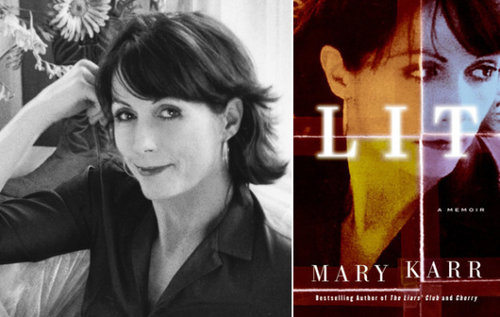Made of Books is a monthly column (partly inspired by hero Roxane Gay) where Christina discusses writing that has been meaningful to her, in one way or another.
I don’t know what compelled me to purchase Lit, Mary Karr’s third memoir, back in 2010. This seriously disappoints me because this book has so profoundly shaped how I think about reading and writing I feel that Lit and me should have some kind of origin story. Instead, I remember curling up on my parents’s sofa, Mary Karr’s sharp humor and gorgeous prose drowning out How I Met Your Mother or the sports my father was watching.
The story picks up where Cherry left off, with 17 year-old Mary Karr in California with a “truck full of extremely stoned surfers.” She refers to them as “my family,” and thus lays out one of the themes of the book— a desire for a stable family, which she didn’t have growing up around the Texas oil fields with two alcoholic parents. What follows is a search for a family, marriage, motherhood, and divorce; Karr’s own struggles with alcoholism; her fraught relationship with her mother. Throughout all of this is the desire to be a poet, to make words her living.
I love this book in part because of the gorgeous writing (Karr describes the sensation of tasting whiskey as how “a poof of sequins went sparking through my middle.”). But I also love it because of the sharp humor she directs at herself, her critical eye never wavering. In one uncomfortably funny scene on being drunk, she’s in a bathtub in a hotel room holding mini bottles of Jack Daniels (thus prompting the observation that “a maxibar is clearly what’s called for”), her suit from her daytime consulting gig still on, her pantyhose twisted around (“the black unwashed soles gross me out”). The Loyola men’s basketball team throws a tennis ball that rattles her door. “You grisly fuckers!” she hollers at them.
Plenty of other passages broke my heart: “In sobriety, I haven’t so much gone insane as awakened to the depth and breadth of my preexisting insanity, a bone-deep sadness or a sense of having been a mistake.”
But in addition to this bone-deep sadness is this bone-deep desire to be a poet. I also experience that feeling, that magnetic pull toward literature. For the foreseeable future, books are as close as we’ll get to being able to understand the thoughts knocking around inside another person’s skull. The good books, fiction or not, shine a light into all the contradictions and ugliness and lightness that make us human. In so doing, they offer readers a glimpse of another life. It’s in this space that empathy grows.
Mary Karr shined a bright light on herself and I learned a lot from her about alcoholism, yes, but also about guilt and forgiveness and gratitude. I learned about passion and how important stories are in shaping us as individuals, whether they come from a book or from the mouth of a parent. Stories matter and we are constantly molded by them. Early on in the book, Karr wrote how “words warranted my devotion— not drugs, not boys. That’s why I clung to the myth that poetry could somehow magically still my scrambled innards.”
Myth indeed. Words weren’t exactly what unscrambled those innards or helped her to finally maintain sobriety, but they were there every step of the way. For many of us, the desire to tell our own stories is deep and the path to telling them is riddled with a myriad of obstacles. But in the end, Mary Karr shows how to tell a true story bravely and boldly, or in the words of Cheryl Strayed, to “write like a motherfucker.”
*Image via Emotichew






I’ve not read a book in many a year (I shamefully admit) So I am unfamiliar with Mary Karr. What I am familiar with is your writing, dear Christina. Whether in poetry or as a masterful critique. I love to read your reaction to a book, a few lines of prose or a delectable meal or even a delightful beverage. What intrigued me the most about your review of Mary Karr’s ‘A Memoir’ is summed up beautifully by your insightful 5th paragraph,
“But in addition to this bone-deep sadness is this bone-deep desire to be a poet. I also experience that feeling, that magnetic pull toward literature. For the foreseeable future, books are as close as we’ll get to being able to understand the thoughts knocking around inside another person’s skull. The good books, fiction or not, shine a light into all the contradictions and ugliness and lightness that make us human. In so doing, they offer readers a glimpse of another life. It’s in this space that empathy grows.”
As an author, I imagine you would have given Mary Karr one of the biggest smiles of her career…. a reaction of empathy expressed in words brought on by what was felt from reading about another life. Excellent!
Thank you for your kind words, Shelley! I’m all smiles.